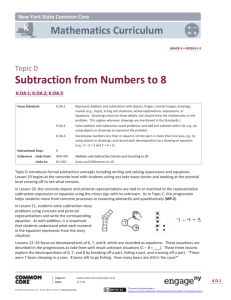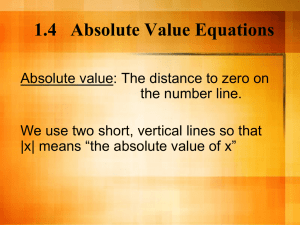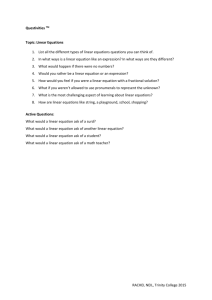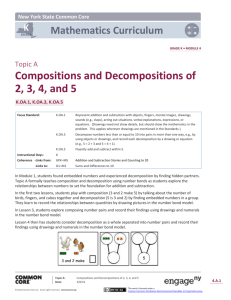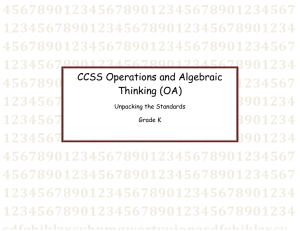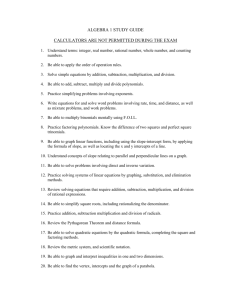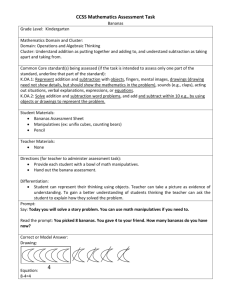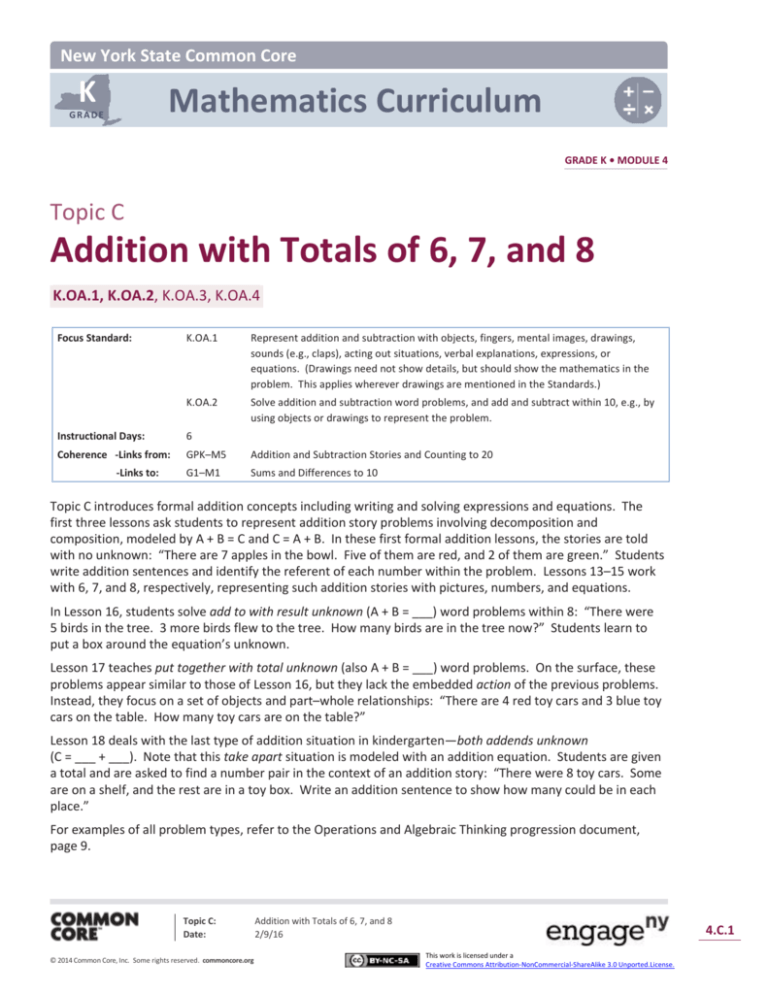
New York State Common Core
K
K
Mathematics Curriculum
GRADE
GRADE K • MODULE 4
Topic C
Addition with Totals of 6, 7, and 8
K.OA.1, K.OA.2, K.OA.3, K.OA.4
Focus Standard:
K.OA.1
Represent addition and subtraction with objects, fingers, mental images, drawings,
sounds (e.g., claps), acting out situations, verbal explanations, expressions, or
equations. (Drawings need not show details, but should show the mathematics in the
problem. This applies wherever drawings are mentioned in the Standards.)
K.OA.2
Solve addition and subtraction word problems, and add and subtract within 10, e.g., by
using objects or drawings to represent the problem.
Instructional Days:
6
Coherence -Links from:
GPK–M5
Addition and Subtraction Stories and Counting to 20
G1–M1
Sums and Differences to 10
-Links to:
Topic C introduces formal addition concepts including writing and solving expressions and equations. The
first three lessons ask students to represent addition story problems involving decomposition and
composition, modeled by A + B = C and C = A + B. In these first formal addition lessons, the stories are told
with no unknown: “There are 7 apples in the bowl. Five of them are red, and 2 of them are green.” Students
write addition sentences and identify the referent of each number within the problem. Lessons 13–15 work
with 6, 7, and 8, respectively, representing such addition stories with pictures, numbers, and equations.
In Lesson 16, students solve add to with result unknown (A + B = ___) word problems within 8: “There were
5 birds in the tree. 3 more birds flew to the tree. How many birds are in the tree now?” Students learn to
put a box around the equation’s unknown.
Lesson 17 teaches put together with total unknown (also A + B = ___) word problems. On the surface, these
problems appear similar to those of Lesson 16, but they lack the embedded action of the previous problems.
Instead, they focus on a set of objects and part–whole relationships: “There are 4 red toy cars and 3 blue toy
cars on the table. How many toy cars are on the table?”
Lesson 18 deals with the last type of addition situation in kindergarten—both addends unknown
(C = ___ + ___). Note that this take apart situation is modeled with an addition equation. Students are given
a total and are asked to find a number pair in the context of an addition story: “There were 8 toy cars. Some
are on a shelf, and the rest are in a toy box. Write an addition sentence to show how many could be in each
place.”
For examples of all problem types, refer to the Operations and Algebraic Thinking progression document,
page 9.
Topic C:
Date:
© 2014 Common Core, Inc. Some rights reserved. commoncore.org
Addition with Totals of 6, 7, and 8
2/9/16
4.C.1
This work is licensed under a
Creative Commons Attribution-NonCommercial-ShareAlike 3.0 Unported.License.
Topic C K
NYS COMMON CORE MATHEMATICS CURRICULUM
A Teaching Sequence Toward Mastery of Addition with Totals of 6, 7, and 8
Objective 1: Represent decomposition and composition addition stories to 6 with drawings and
equations with no unknown.
(Lesson 13)
Objective 2: Represent decomposition and composition addition stories to 7 with drawings and
equations with no unknown.
(Lesson 14)
Objective 3: Represent decomposition and composition addition stories to 8 with drawings and
equations with no unknown.
(Lesson 15)
Objective 4: Solve add to with result unknown word problems to 8 with equations. Box the unknown.
(Lesson 16)
Objective 5: Solve put together with total unknown word problems to 8 using objects and drawings.
(Lesson 17)
Objective 6: Solve both addends unknown word problems to 8 to find addition patterns in number pairs.
(Lesson 18)
Topic C:
Date:
© 2014 Common Core, Inc. Some rights reserved. commoncore.org
Addition with Totals of 6, 7, and 8
2/9/16
4.C.2
This work is licensed under a
Creative Commons Attribution-NonCommercial-ShareAlike 3.0 Unported.License.




